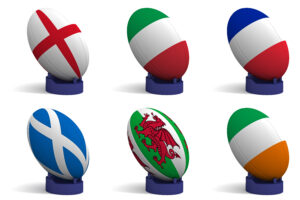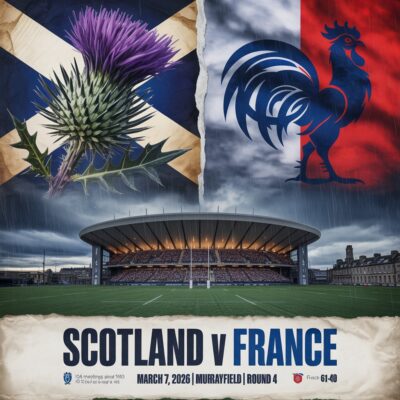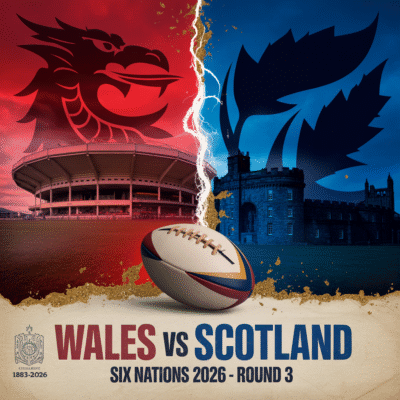You know the drill. It’s a Saturday morning in Manhattan. You’ve dragged yourself out of bed for the 9:15 AM kick-off. You walk into a “sports bar,” and what do you find? The commentary is drowned out by brunch playlists, the Guinness is a rush job, and—worst of all—the bartender tells you they can’t pour a pint until 10:00 AM.
Get Directions to Our 14th Street Location | 2026 Six Nations Schedule
Not at The Winslow.
We are Gramercy’s dedicated home for the 2026 Six Nations Championship. Whether you’re bleeding Bleu for France, wearing the Rose, or screaming for the Scots, The Winslow is the neutral ground where the game comes first. Located at the crossroads of the East Village, Union Square, and Gramercy, we solve the three logistical nightmares that plague NYC rugby fans who commute from Brooklyn, Queens and from all over.
Le Crunch: France vs England—The Final Showdown
High Stakes in Dublin: Ireland v Scotland Finale
Wales vs Italy: Super Saturday Showdown Could Decide the Wooden Spoon
Italy v England: The Azzurri Hunt History in Rome
Scotland v France: Redemption or Ruin at Murrayfield
Ireland vs Wales: Round Four Six Nations Showdown in Dublin
Wales vs Scotland: Round 3 Preview – The Principality Awaits
France vs. Italy: Les Bleus Hunt Garibaldi Glory in Lille – Six Nations Round 3
England v Ireland: Twickenham Showdown Set to Define Six Nations Contenders
Six Nations Round 2: Wales vs. France | Redemption or Repeat at the Principality?
The Calcutta Cup: Scotland vs. England at Murrayfield
The NYC Rugby Report: Ireland v Italy Preview
England v Wales: Twickenham Grudge Match Opens the 2026 Six Nations
Italy vs Scotland: Six Nations 2026 Round 1 Preview
France vs. Ireland: The Championship Opener That Sets the Tone
The Winslow
243 E 14th St (Between 2nd & 3rd Ave)
New York, NY 10003
(212) 777-7717
From the L Train (Brooklyn/North Brooklyn):
We are arguably the most accessible rugby bar for Brooklynites. Take the L to 3rd Ave. Use the 14th St & 3rd Ave exit, walk east half a block, and you’re here. Total commute from Williamsburg: ~15 minutes.
From Union Square (Uptown/Queens/Bronx):
A 5-minute walk from the 4/5/6/N/Q/R/W hub. Walk east on 14th Street, pass the Trader Joe’s (not the Ave A one, the Union Square one!), and look for us on the north side of the street.
Landmarks:
We are just down the block from the 14th St. Artichoke Basille’s Pizza and just south of Stuyvesant Square Park.
2026 Six Nations Schedule & Hours
Doors open 30 minutes prior to the first kick-off of the day. All times Eastern.
Why NYC Rugby Fans Choose The Winslow for Six Nations
Here’s what sets us apart as a proper rugby bar in NYC:
1. Pints Pour When Doors Open
The Winslow serves alcohol from the moment we open our doors. If the match kicks off at 9 AM, you can enjoy a proper pint during the first half—not a lukewarm coffee while you watch everyone else’s Instagram stories from London pubs.
2. Sound ON. Always.
Rugby isn’t rugby without the ref’s mic and the stadium roar. We prioritize match audio over background playlists. If the Six Nations is on, the sound is on. No compromises.
3. No Reservations, No Politics
We operate on a strict First Come, First Served basis for all Six Nations matches. We don’t hold tables for VIPs or accept bookings that create dead zones in the bar. If you want the best seat in the house, bring your squad and get here 30-45 minutes before kick-off for big matches (especially England vs. Ireland or “Super Saturday”).
Dedicated to Serving the NYC Rugby Community
As part of our wider commitment to being New York City’s premier rugby bar, we’ve built The Winslow to be more than just a place with a screen. We’re a British-style bar and eatery that understands what rugby fans actually need on match day: quality drinks, proper food, and an atmosphere that respects the game.
Watching the Six Nations in New York City is often a compromise. You usually have to choose between a dive bar with great atmosphere but terrible drinks, or a gastropub with great food but zero energy.
We bridge the gap.
Location & Logistics: How to Find Us
We are located on the border of Gramercy, the East Village, and Union Square, making The Winslow the easiest meet-up point for groups coming from Brooklyn, Uptown, or Jersey. We’ve learned that the L Train crowd from Brooklyn tends to arrive earlier than the Union Square commuters. If you’re coming from North Brooklyn or Williamsburg, you’ll beat the rush. If you’re coming from Uptown or Queens, give yourself an extra 10 minutes to navigate the Union Square subway maze and walk east on 14th Street past the Trader Joe’s (the Union Square one, not the Ave A location).
Frequently Asked Six Nations Rugby Questions
Do I need a reservation for Six Nations matches?
No. We operate on a strict First Come, First Served policy for all Six Nations matches. This ensures a fair playing field for all fans. We recommend arriving at least 30-45 minutes before kick-off for big matches (especially England vs. Ireland or “Super Saturday”).
Do you serve alcohol during the morning matches?
Yes. Unlike many NYC venues restricted by the “Sunday Morning Law,” The Winslow serves alcohol from the moment we open our doors. You can enjoy a pint during the first half of a 9 AM or 10 AM game.
Is the sound on for every game?
Yes. If the Six Nations is on, the Sound is ON. We are a rugby bar first during the tournament.
Are you a specific supporter club bar?
We are a neutral venue. We welcome fans of England, Ireland, Scotland, Wales, France, and Italy equally. The banter is high, but the vibe is friendly.
Can I bring a large group?
Absolutely. We encourage groups to arrive together early to claim a section. Just remember: no reservations, so coordination is key.
Do you show other rugby tournaments?
Yes. We are a year-round rugby bar in NYC, showing Autumn Internationals, Rugby World Cup, and select club matches. Check our events calendar for the full schedule.
Some More Light Reading About the Six Nations
The Six Nations Championship is an annual international rugby union competition between the national men’s teams of England, France, Ireland, Italy, Scotland, and Wales.
The tournament originated as the Home Nations Championship in 1883, contested annually between England, Ireland, Scotland, and Wales. It became the Five Nations Championship in 1910 with the addition of France and expanded in 2000 to become the Six Nations Championship when Italy joined.
The format creates intense rivalries given the geographic proximity of the nations. The Winslow is a dedicated Rugby Bar in NYC that will be showing all matches live, opening up 30 minutes early whenever necessary.
Participating Teams
Six teams compete annually for the Championship:
- England – A founding Home Nation. England has won the championship 29 times outright, the most of any team. They are known as the Red Rose.
- France – Joined in 1910. Les Bleus are the defending 2025 champions and have won the title 18 times outright.
- Ireland – A founding Home Nation representing both the Republic of Ireland and Northern Ireland. The Men in Green have 16 outright titles and are the current Triple Crown holders (2025).
- Italy – The newest member (joined 2000). The Azzurri are yet to win the tournament but have become increasingly competitive, avoiding the “Wooden Spoon” in recent years.
- Scotland – A founding Home Nation. Their best finish in the Six Nations era is 3rd, though they won the final Five Nations in 1999. They are known as the Thistle.
- Wales – A founding nation tied with England for the most total titles (39). Known as the Dragons.
Tournament Format
The Championship utilizes a round-robin format where each team plays every other team once, resulting in 15 total matches.
- Home & Away: Teams alternate home and away fixtures each year.
- Schedule: Matches take place over five rounds in February and March.
- The Winner: The team with the most points at the end is declared the champion. The format rewards consistency; slip-ups can be costly as every match carries equal weight.
Scoring and Rankings
Teams are awarded match points to determine the standings:
- 4 points for a win.
- 2 points for a draw.
- 0 points for a loss.
Bonus Points:
- 1 point for scoring 4 or more tries in a match.
- 1 point for losing by 7 points or less.
- 3 points are awarded to a team that wins all 5 matches (a Grand Slam) to ensure they cannot be overtaken on the table.
Trophies and Awards
- The Championship Trophy: A sterling silver trophy with 15 side panels representing the 15 team members.
- Grand Slam: Achieved when one nation defeats all five others. France was the last to achieve this in 2022.
- Triple Crown: Awarded when one of the Home Nations (England, Scotland, Ireland, Wales) defeats the other three. Ireland currently holds the Triple Crown after their performance in 2025.
- Wooden Spoon: The informal “title” for the team that finishes last.
Rivalry Trophies:
- Calcutta Cup: England vs. Scotland (Oldest trophy, est. 1879).
- Millennium Trophy: England vs. Ireland.
- Centenary Quaich: Ireland vs. Scotland.
- Giuseppe Garibaldi Trophy: France vs. Italy.
- Auld Alliance Trophy: France vs. Scotland.
- Doddie Weir Cup: Wales vs. Scotland.
- Cuttitta Cup: Italy vs. Scotland.
Where to Watch in the US
NBC Sports holds the exclusive rights to the Six Nations in the United States.
- Streaming: All matches are streamed live on Peacock Premium.
- TV: Select matches may be broadcast on CNBC or NBC, but Peacock is the only place to guarantee every game live.
- At The Winslow: We show every single match live with sound, accompanied by our full food and drink menu.
Venues
Matches are played in the national stadiums of each country:
- England: Twickenham Stadium (London)
- Wales: Principality Stadium (Cardiff)
- Scotland: Murrayfield Stadium (Edinburgh)
- Ireland: Aviva Stadium (Dublin)
- Italy: Stadio Olimpico (Rome)
- France: Stade de France (Paris)
















